1
Logging on the River
1830's onward
Cascapedia Valley

2
Logging on the Grand Cascapedia River became a means of survival for the small community. The surrounding forests provided the natural resource and the river a way to transport the logs down to then many sawmills that were built in the valley.
3
The Log Drive
1830's - 1960's
Cascapedia Valley
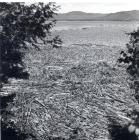
4
The Grand Cascapedia River was well suited for the lumber industry. The surrounding mountains held hundreds of square miles of dense forests.
5
Downstream
1830's 1960's
Cascapedia Valley
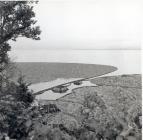
6
During the spring freshet the logs were put in the river to begin their journey downstream to the mouth of the river.
7
Man Power
1830's - 1960's
Cascapedia Valley
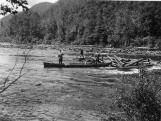
8
In the spring of the year when the snow melted and the river thawed, the logs began their journey down river. The lumber men followed the drive in canoes because the logs were often trapped against obstacles such as the river banks and fallen trees across the river and had to be released. These were courageous strong able men as the river was treacherous at this time of year and several lost their lives.
9
A Shared River
1870's onward
Grand Cascapedia River
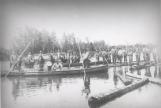
10
There are many stories about salmon fishing during the log drive on the river. Often the fishermen had to stay off the river for several days waiting for the logs to move down river past the salmon pools.
11
A Need for a Compromise
1870's onward
Grand Cascapedia River
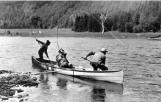 Credits:
Credits:
Hoagy Carmichael
12
The loggers and fishermen shared the same river at the same time of the year. In 1897 an entry in the Lorne Cottage fishing camp log book notes that " Logs running for a week - make fishing impossible" It was very dangerous situation as the guides had to keep watch not only on the salmon and guest fishermen, but on the position of the oncoming logs as well. There are many stories about the fishermen lowering their rod tips down in order for a log to pass through the pool.
13
Sawmills
1830's onward
Cascapedia Valley

14
The forestry operations meant work for the local population during the winter and spring months of the year.